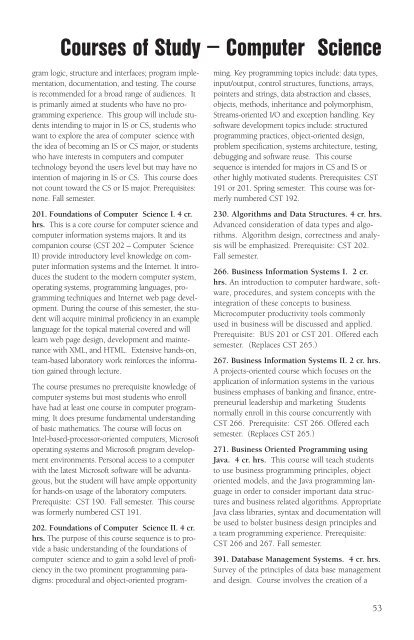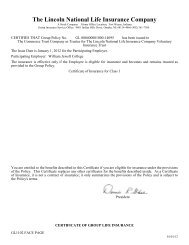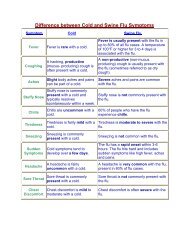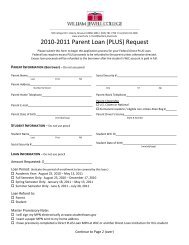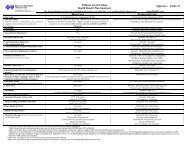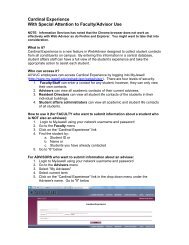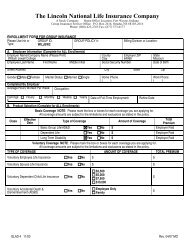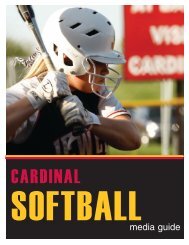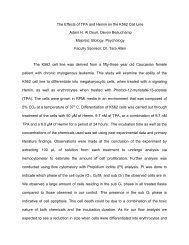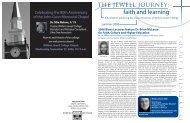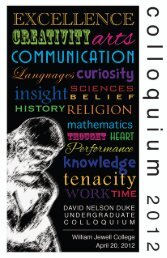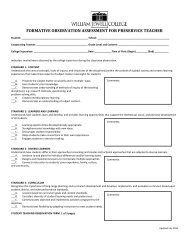Courses of Study - William Jewell College
Courses of Study - William Jewell College
Courses of Study - William Jewell College
You also want an ePaper? Increase the reach of your titles
YUMPU automatically turns print PDFs into web optimized ePapers that Google loves.
<strong>Courses</strong> <strong>of</strong> <strong>Study</strong> – Computer Science<br />
gram logic, structure and interfaces; program implementation,<br />
documentation, and testing. The course<br />
is recommended for a broad range <strong>of</strong> audiences. It<br />
is primarily aimed at students who have no programming<br />
experience. This group will include students<br />
intending to major in IS or CS, students who<br />
want to explore the area <strong>of</strong> computer science with<br />
the idea <strong>of</strong> becoming an IS or CS major, or students<br />
who have interests in computers and computer<br />
technology beyond the users level but may have no<br />
intention <strong>of</strong> majoring in IS or CS. This course does<br />
not count toward the CS or IS major. Prerequisites:<br />
none. Fall semester.<br />
201. Foundations <strong>of</strong> Computer Science I. 4 cr.<br />
hrs. This is a core course for computer science and<br />
computer information systems majors. It and its<br />
companion course (CST 202 – Computer Science<br />
II) provide introductory level knowledge on computer<br />
information systems and the Internet. It introduces<br />
the student to the modern computer system,<br />
operating systems, programming languages, programming<br />
techniques and Internet web page development.<br />
During the course <strong>of</strong> this semester, the student<br />
will acquire minimal pr<strong>of</strong>iciency in an example<br />
language for the topical material covered and will<br />
learn web page design, development and maintenance<br />
with XML, and HTML. Extensive hands-on,<br />
team-based laboratory work reinforces the information<br />
gained through lecture.<br />
The course presumes no prerequisite knowledge <strong>of</strong><br />
computer systems but most students who enroll<br />
have had at least one course in computer programming.<br />
It does presume fundamental understanding<br />
<strong>of</strong> basic mathematics. The course will focus on<br />
Intel-based-processor-oriented computers, Micros<strong>of</strong>t<br />
operating systems and Micros<strong>of</strong>t program development<br />
environments. Personal access to a computer<br />
with the latest Micros<strong>of</strong>t s<strong>of</strong>tware will be advantageous,<br />
but the student will have ample opportunity<br />
for hands-on usage <strong>of</strong> the laboratory computers.<br />
Prerequisite: CST 190. Fall semester. This course<br />
was formerly numbered CST 191.<br />
202. Foundations <strong>of</strong> Computer Science II. 4 cr.<br />
hrs. The purpose <strong>of</strong> this course sequence is to provide<br />
a basic understanding <strong>of</strong> the foundations <strong>of</strong><br />
computer science and to gain a solid level <strong>of</strong> pr<strong>of</strong>iciency<br />
in the two prominent programming paradigms:<br />
procedural and object-oriented programming.<br />
Key programming topics include: data types,<br />
input/output, control structures, functions, arrays,<br />
pointers and strings, data abstraction and classes,<br />
objects, methods, inheritance and polymorphism,<br />
Streams-oriented I/O and exception handling. Key<br />
s<strong>of</strong>tware development topics include: structured<br />
programming practices, object-oriented design,<br />
problem specification, systems architecture, testing,<br />
debugging and s<strong>of</strong>tware reuse. This course<br />
sequence is intended for majors in CS and IS or<br />
other highly motivated students. Prerequisites: CST<br />
191 or 201. Spring semester. This course was formerly<br />
numbered CST 192.<br />
230. Algorithms and Data Structures. 4 cr. hrs.<br />
Advanced consideration <strong>of</strong> data types and algorithms.<br />
Algorithm design, correctness and analysis<br />
will be emphasized. Prerequisite: CST 202.<br />
Fall semester.<br />
266. Business Information Systems I. 2 cr.<br />
hrs. An introduction to computer hardware, s<strong>of</strong>tware,<br />
procedures, and system concepts with the<br />
integration <strong>of</strong> these concepts to business.<br />
Microcomputer productivity tools commonly<br />
used in business will be discussed and applied.<br />
Prerequisite: BUS 201 or CST 201. Offered each<br />
semester. (Replaces CST 265.)<br />
267. Business Information Systems II. 2 cr. hrs.<br />
A projects-oriented course which focuses on the<br />
application <strong>of</strong> information systems in the various<br />
business emphases <strong>of</strong> banking and finance, entrepreneurial<br />
leadership and marketing Students<br />
normally enroll in this course concurrently with<br />
CST 266. Prerequisite: CST 266. Offered each<br />
semester. (Replaces CST 265.)<br />
271. Business Oriented Programming using<br />
Java. 4 cr. hrs. This course will teach students<br />
to use business programming principles, object<br />
oriented models, and the Java programming language<br />
in order to consider important data structures<br />
and business related algorithms. Appropriate<br />
Java class libraries, syntax and documentation will<br />
be used to bolster business design principles and<br />
a team programming experience. Prerequisite:<br />
CST 266 and 267. Fall semester.<br />
391. Database Management Systems. 4 cr. hrs.<br />
Survey <strong>of</strong> the principles <strong>of</strong> data base management<br />
and design. Course involves the creation <strong>of</strong> a<br />
53


